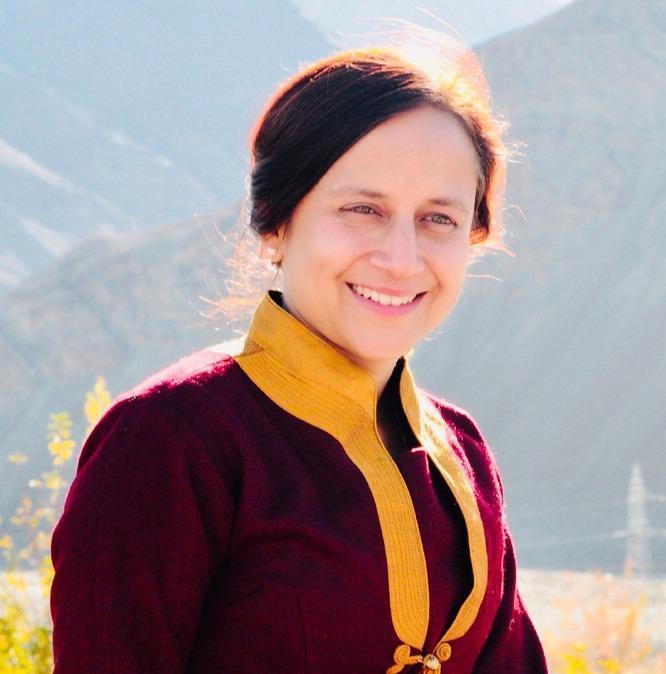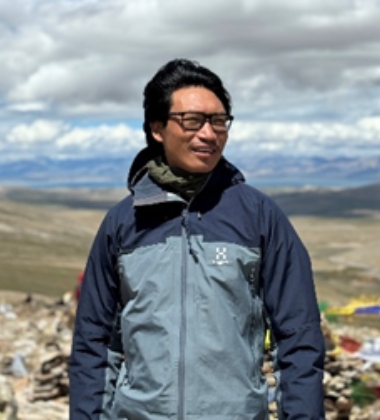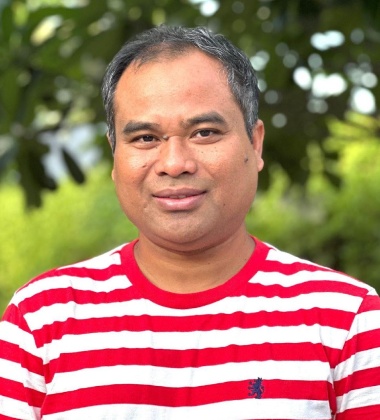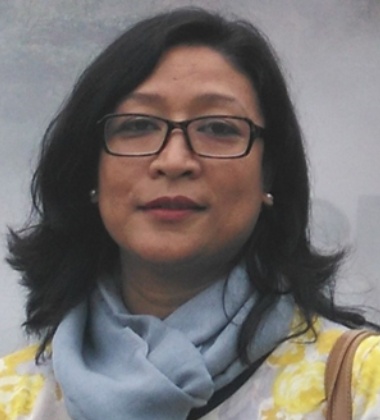The Himalayan University Consortium is proud to be a partner in a worldwide education coalition in support of the Right Here, Right Now Global Climate Summit.
The 4 – 7 June Right Here, Right Now Global Climate Summit hosted by United Nations Human Rights and the University of Oxford will take place virtually and in person in selected locations. The cornerstone of the summit is a 24-hour global plenary, which will be co-delivered by universities and partners across the world and broadcast live across time zones on 5 June. The summit will bring together thought leaders,communities, youth activists, Indigenous Peoples, and scientific, political, educational, cultural and industry experts from around the world for keynote addresses and panels exploring how climate change impacts fundamental rights, including the right to food, safe water, housing and health.
Scientific data about the Hindu Kush Himalaya and advanced technology-enabled methodologies and tools are increasingly available, local communities have documented and communicated their climate change-induced experience and adaptation practices, and more policies have been formulated based on scientific evidence. Nonetheless, the effectiveness of climate action remains limited and decisions continue to be made elsewhere outside of the local communities without the best available science.
In a HUC-led virtual session titled Engaging Community, Science, and Decisionmakers in Human Rights-Based Climate Action – a Himalayan Experience, four panelists – a community-based practitioner, a scientist, an Indigenous knowledge-holder-cum-advocate, and a scientist-cum-policymaker from Bangladesh, Bhutan, India and Nepal will share the best practice of their work and how it is aligned with the rights-based responses to climate change. Each panelist will pose a thought-provoking question for their peer, aiming to identify the conceptual and practice gaps that need to be bridged to ensure risk-informed decision-making and meaningful climate action.
The session will feature a four-way conversation among speakers to reflect on what works and what doesn’t to ensure that climate action is informed by human rights, including the right to benefit from scientific progress and its applications and serves those most affected by climate change. It raises questions beyond access to information and the best available science. By pointing to the need to invert the construction of climate information through bottom-up, community-led knowledge co-production and solution co-design, the session seeks to emphasize the importance of anchoring science in society and the role of stakeholders in setting the research agenda. A genuine and productive partnership between the community, academia, and policymakers is key to ensuring risk-informed decision-making for meaningful climate action.
Learners and educators of all ages, from primary school classrooms to university research labs, are invited to engage in this event through the Right Here, Right Now Education Coalition. Registration is open to all.
Speakers
Gitanjali Angmo
Sonam Wangchuk
Shohel Chandra Hajang
Archana Shrestha

Gitanjali Angmo
Founder and CEO, Himalayan Institute of Alternative, Leh Ladakh, India
An entrepreneur turned educator, Gitenjali is passionate about creating an environment that empowers learners and facilitators to become the best versions of themselves. Gifted in multiple disciplines such as business, education, performing and martial arts, she believes that human beings can contribute to grow into multi-faceted individuals throughout their lives, and the aim of education is to instill this lifelong quest for learning and progressing.

Sonam Wangchuk
Cryosphere Specialist, ICIMOD
Sonam Wangchuk is a Cryosphere Specialist at ICIMOD, with extensive experience in satellite and field-based cryosphere research, particularly in the Hindu Kush Himalaya (HKH) and Arctic regions. Before joining ICIMOD, he worked as a postdoctoral researcher at Vrije Universiteit Amsterdam in the Netherlands. Sonam holds a PhD through a joint program between the University of St Andrews, UK, and the University of Zurich, Switzerland. He also earned an MSc from Warsaw University of Technology, Poland, and a BSc from the Royal University of Bhutan. His research focuses on understanding the dynamics of permafrost, glaciers, and the broader cryosphere to support sustainable mountain development and climate resilience in the HKH.

Shohel Chandra Hajang
Human Rights Programme Officer, Asia Indigenous Peoples Pact (AIPP)
Shohel Chandra Hajang is the Human Rights Programme Officer at the Asia Indigenous Peoples Pact (AIPP). He belongs to the Hajong Indigenous community in Bangladesh and is an Executive Member of the Bangladesh Indigenous Peoples Forum.
Shohel holds a Master of Development Practice from James Cook University in Australia and has over 10 years of experience in human rights advocacy for Indigenous Peoples at the national, regional, and international levels.
He is also actively involved in strengthening the Indigenous Peoples Human Rights Defenders (IPHRDs) network in Asia and works to enhance the solidarity, cooperation, and capacities of Indigenous Peoples across the region. His efforts focus on promoting their rights, cultures, identities, and sustainable resource management systems.

Archana Shrestha
Deputy Director General, Department of Hydrology and Meteorology, Ministry of Energy, Water Resources and Irrigation, Government of Nepal
Dr. Archana Shrestha is Deputy Director General at Department of Hydrology and Meteorology (DHM) of Nepal. As a head of Climate Division, she is responsible in leading scientific analysis of state of the climate and climate change and in delivering seasonal prediction and climate services of Nepal. She also worked as a focal person for the Adaptation to Climate Change for the Ministry of Population and Environment, a focal point of UNFCCC and IPCC. She was a technical coordinator of study on “Observed Climate Trends of Nepal (2017) and Climate Change Scenarios of Nepal (2018) as a part of National Adaptation Plan. She also participated in the Sagarmatha National Sambaad 2020 as a panelist in the Panel Discussion titled “ Ambition for 1.5 degree Celsius: Urgency for Action for Action in Mountains and Beyond: Way Forward for the Future of Humanity”.
Under her leadership, DHM is transforming traditional weather forecast and climate products to user friendly climate services for anticipatory actions for weather hazards and climate resilient Nepal. She has coordinated with National Emergency Operation Center and National Disaster Risk Reduction and Management Authority of Ministry of Home Affairs and other Ministries and their departments in providing weather forecasting and warning services in addition to public weather service for the Anticipatory Actions in the country. As a Chief of Agrometeorology she played a lead role starting weekly weather information and weekly weather forecast and weekly Agrometeorological Advisory for Farmers Nepal in collaboration with Ministry of Agriculture Development and National Agriculture Research Center (NARC). She was a coordinator of field study team and one the editors and lead authors of the First recorded Bara-Parsa Tornado Study. She also led a number of community-based weather-related disaster management and climate modelling research projects, of Asia Pacific Network (APN), United Nations Institute for Training And Research (UNITAR). She also worked as a Junior Associate on regional climate modeling in the Abdus Salam International Center of Theoretical Physics, Italy and conducted research on Regional Climate Modeling for South Asia.
She completed her PhD in Atmospheric Science from the University of Wisconsin-Madison, USA under the Fulbright International Science and Technology PhD Program. She did Masters in Science from University of Guelph, Canada and Tribhuvan University, Nepal in Hydrology and Meteorology.
Currently, she a Board member of the Fulbright Commission, Nepal and life member of Society of Hydrologist and Meteorologists, Nepal. She is also a founding Member of the South Asian Meteorological Association (SAMA) and South Asian Forum of Agriculture Meteorology (SAFOM) and a nominated member (Nepal) of the Scientific Advisory Committee, BIMSTEC Center for Weather and Climate. She has contributed to the number of joint papers and chapters in books related to weather and climate sciences. In addition, she is a recipient of academic awards: Crown Prince Youth Science and Technology Award-2005/06, Mahendra Bidhya Bhushan Award, 1998, Nepal Bidhya Bhushan Award-2018.

